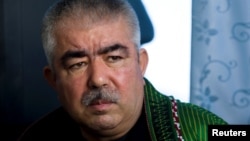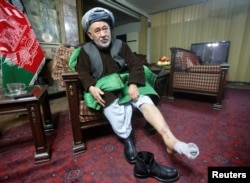NATO confirmed Tuesday that Afghanistan’s vice president, Abdul Rashid Dostum, tried to return to the country overnight but that his private plane was denied permission to land in the northern city of Mazar-i-Sharif.
Dostum, a 63-year-old ethnic Uzbek warlord, and some of his militia guards, have been under investigation for months over allegations of torturing and sexually assaulting an elderly political rival by the name of Ahmad Ishchi.
The first vice president left the country for Turkey about two months ago, saying he needed health care, a move prompting allegations Afghan President Ashraf Ghani allowed Dostum to travel abroad under a secret deal to escape prosecution.
“What happened with General Dostum was that he was denied permission to land in Mazar-i-Sharif,” a spokesman for NATO’s Resolute Support mission, Bill Salvin, told VOA.
“While we were asked to make a phone call to try and get permission for the first vice president to land, we declined to make that phone call because our commander up in the north said that this is not the role of Resolute Support,” Salvin added, without naming the caller.
He noted that the international mission’s role is to provide training, advice and assistance to Afghan security forces and it would not have been appropriate to intervene in internal Afghan matters.
Local media reported that aviation authorities directed Dostum’s plane to Kabul’s international airport but instead, it turned back and landed in the neighboring central Asian state of Turkmenistan.
Dostum’s spokespeople and political allies in Afghanistan have denied that he was on the plane, saying the first vice president is still in Turkey.
The Afghan government has not commented.
Reports of comeback attempt
The controversial Uzbek strongman attempted to stage Monday’s dramatic comeback days after he formed a three-party political alliance, which also involved Governor Mohammad Atta Noor of the northern Afghan province, where the aircraft tried to land on Monday.
The formation of the coalition was announced in Turkey and it brings together discontented political groups that are also part of the government.
Noor has also rejected reports Dostum was on board the plane. A statement quoted the governor as saying a group of engineers was on the flight and technical problems forced the plane to return to Turkey.
Afghan judicial officials announced earlier this month that the probe into allegations against Dostum and his men has been completed and sent to the court for further action.
President Ghani has been under pressure at home and from Afghanistan’s international backers led by the United States to ensure “extremely serious” charges against his vice president are reviewed and follow-up legal action is taken.
The acting U.S. ambassador to Kabul last week emphasized that the legal process underscores the Afghan state’s effort to uphold the rule of law and combat impunity, and to send a signal to the world that no one is above the law in Afghanistan.
Late last year, Ishchi, a former provincial governor, said in a nationally televised interview that Dostum's militiamen detained, tortured and sexually assaulted him. He alleged that Dostum had ordered the detention and abuse.
Observers say that Monday’s incident is likely to fuel tensions between Dostum and Ghani. The warlord, who enjoys a strong following in northern Afghan regions, has rejected charges against him as politically motivated and an attempt to marginalize him.
Ghani has defended Dostum's departure from Afghanistan, saying he left with the permission of the attorney general and that the laws do not bar someone suspected of wrongdoing from seeking medical treatment abroad.





